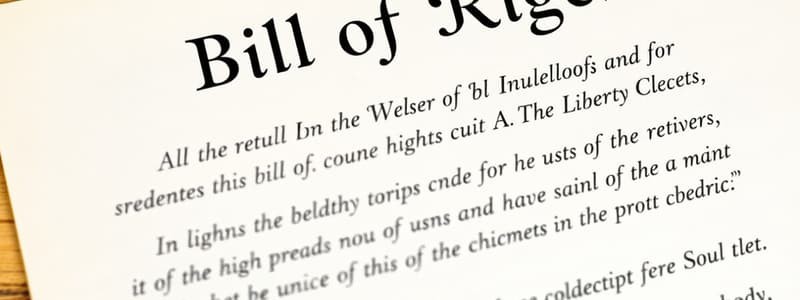Podcast
Questions and Answers
The ______ Amendment protects the right to keep and bear arms.
The ______ Amendment protects the right to keep and bear arms.
Second
The ______ Amendment prohibits excessive bail and cruel and unusual punishment.
The ______ Amendment prohibits excessive bail and cruel and unusual punishment.
Eighth
The ______ Amendment guarantees the right to a jury trial in civil cases.
The ______ Amendment guarantees the right to a jury trial in civil cases.
Seventh
The ______ Amendment abolished slavery and involuntary servitude.
The ______ Amendment abolished slavery and involuntary servitude.
The ______ Amendment initiated prohibition.
The ______ Amendment initiated prohibition.
The ______ Amendment repealed the Eighteenth Amendment, ending prohibition.
The ______ Amendment repealed the Eighteenth Amendment, ending prohibition.
The ______ Amendment extends the right to vote to women.
The ______ Amendment extends the right to vote to women.
The ______ Amendment lowers the voting age from 21 to 18.
The ______ Amendment lowers the voting age from 21 to 18.
Flashcards
First Amendment
First Amendment
Protects freedom of speech, religion, press, assembly, and petition.
Second Amendment
Second Amendment
Protects the right to keep and bear arms.
Fourth Amendment
Fourth Amendment
Protects against unreasonable searches and seizures.
Fifth Amendment
Fifth Amendment
Signup and view all the flashcards
Thirteenth Amendment
Thirteenth Amendment
Signup and view all the flashcards
Fourteenth Amendment
Fourteenth Amendment
Signup and view all the flashcards
Nineteenth Amendment
Nineteenth Amendment
Signup and view all the flashcards
Twenty-Sixth Amendment
Twenty-Sixth Amendment
Signup and view all the flashcards
Study Notes
The Bill of Rights
- The First Amendment protects freedom of speech, religion, press, assembly, and petition.
- The Second Amendment protects the right to keep and bear arms.
- The Third Amendment prevents the government from quartering soldiers in private homes.
- The Fourth Amendment protects against unreasonable searches and seizures.
- The Fifth Amendment protects against self-incrimination, guarantees due process, prohibits double jeopardy, and ensures compensation for eminent domain.
- The Sixth Amendment ensures the right to a fair and speedy trial.
- The Seventh Amendment guarantees the right to a jury trial in civil cases.
- The Eighth Amendment prohibits excessive bail and cruel and unusual punishment.
- The Ninth Amendment protects unenumerated rights.
- The Tenth Amendment reserves powers not delegated to the federal government to the states or the people.
Other Amendments
- The Eleventh Amendment limits the ability of individuals to sue states in federal court.
- The Twelfth Amendment changes the procedure for electing the president and vice president.
- The Thirteenth Amendment abolished slavery and involuntary servitude.
- The Fourteenth Amendment grants citizenship to all persons born or naturalized in the United States, guarantees equal protection under the law, and extends civil liberties.
- The Fifteenth Amendment prohibits denying the right to vote based on race, color, or previous condition of servitude.
- The Sixteenth Amendment authorizes the federal government to collect income taxes.
- The Seventeenth Amendment establishes the direct election of US senators.
- The Eighteenth Amendment initiated prohibition.
- The Nineteenth Amendment extends the right to vote to women.
- The Twentieth Amendment changes the dates for the start of presidential, vice presidential, and congressional terms and addresses presidential succession.
- The Twenty-First Amendment repealed the Eighteenth Amendment, ending prohibition.
- The Twenty-Second Amendment limits the presidency to two terms.
- The Twenty-Third Amendment grants residents of Washington, D.C. the right to vote in presidential elections.
- The Twenty-Fourth Amendment prohibits poll taxes in federal elections.
- The Twenty-Fifth Amendment clarifies presidential succession and procedures for addressing presidential disability.
- The Twenty-Sixth Amendment lowers the voting age from 21 to 18.
- The Twenty-Seventh Amendment delays Congressional pay changes from taking effect until after the next election.
Studying That Suits You
Use AI to generate personalized quizzes and flashcards to suit your learning preferences.




